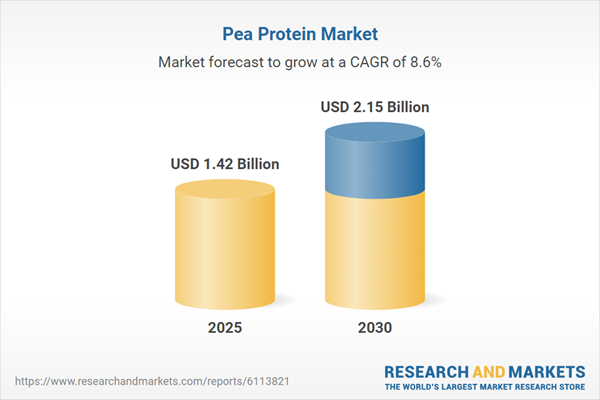The Global Pea Protein Market Study provides a comprehensive analysis of the rapidly evolving pea protein industry, driven by increasing demand for plant-based proteins and sustainable food solutions. This study targets industry experts, offering detailed insights into market dynamics, technological advancements, and competitive strategies shaping the global pea protein landscape. With a focus on key market players and their recent developments, the Global Pea Protein Market Study aims to equip stakeholders with actionable intelligence to navigate this dynamic market.
Market Overview and Scope
The Global Pea Protein Market Study examines the market's growth trajectory, segmented by source (organic and conventional), type (protein concentrates, isolates, hydrolysates, and textured pea protein), form (liquid and dry), application (meat substitutes, dietary supplements, food and beverages, pharmaceuticals, and animal feed), and geography (North America, South America, Europe, Middle East and Africa, and Asia Pacific). The study leverages a robust research methodology, combining primary and secondary data sources, to deliver precise market forecasts and competitive intelligence.Competitive Environment and Analysis
The competitive landscape section of the Global Pea Protein Market Study highlights the strategic initiatives of major players, including product innovations, expansions, and partnerships. Below are two notable developments from key market players:Roquette Frères: In February 2024, Roquette Frères launched four multi-functional pea proteins under its NUTRALYS® range, designed to enhance taste, texture, and versatility in plant-based foods and high-protein nutritional products. This innovation strengthens Roquette's position as a global leader in plant-based ingredients, addressing consumer demand for improved sensory profiles in meat alternatives and dietary supplements. Additionally, in November 2021, Roquette opened the world’s largest pea protein factory in Canada, significantly boosting its production capacity to meet rising global demand.
Ingredion Incorporated: In July 2024, Ingredion introduced Vitessence Pea 100 HD, a pea protein optimized for cold-pressed bars in the U.S. and Canada markets, offering enhanced softness and shelf-life stability. This product launch reflects Ingredion’s commitment to addressing consumer preferences for high-protein, plant-based snacks. Furthermore, Ingredion’s VITESSENCE® Pulse 1803 pea protein isolate, launched in 2023, targets the EMEA region’s demand for high-protein plant-based foods, showcasing the company’s focus on regional market expansion and innovation.
These developments underscore the intense competition and innovation within the pea protein market, as companies invest in R&D and production capacity to capture growing consumer interest in sustainable and health-focused protein solutions.
The Global Pea Protein Market Study offers industry experts a detailed roadmap to understand the competitive dynamics and growth opportunities in the pea protein sector. By analyzing key developments from leading players like Roquette Frères and Ingredion Incorporated, the study highlights the strategic importance of innovation and scalability in maintaining market leadership. As the demand for plant-based proteins continues to surge, the Global Pea Protein Market Study serves as an essential resource for stakeholders aiming to capitalize on emerging trends and navigate the competitive landscape effectively.
Key Benefits of this Report:
- Insightful Analysis: Gain detailed market insights covering major as well as emerging geographical regions, focusing on customer segments, government policies and socio-economic factors, consumer preferences, industry verticals, and other sub-segments.
- Competitive Landscape: Understand the strategic maneuvers employed by key players globally to understand possible market penetration with the correct strategy.
- Market Drivers & Future Trends: Explore the dynamic factors and pivotal market trends and how they will shape future market developments.
- Actionable Recommendations: Utilize the insights to exercise strategic decisions to uncover new business streams and revenues in a dynamic environment.
- Caters to a Wide Audience: Beneficial and cost-effective for startups, research institutions, consultants, SMEs, and large enterprises.
What do businesses use our reports for?
Industry and Market Insights, Opportunity Assessment, Product Demand Forecasting, Market Entry Strategy, Geographical Expansion, Capital Investment Decisions, Regulatory Framework & Implications, New Product Development, Competitive IntelligenceReport Coverage:
- Historical data from 2022 to 2024 & forecast data from 2025 to 2030
- Growth Opportunities, Challenges, Supply Chain Outlook, Regulatory Framework, and Trend Analysis
- Competitive Positioning, Strategies, and Market Share Analysis
- Revenue Growth and Forecast Assessment of segments and regions including countries
- Company Profiling (Strategies, Products, Financial Information, and Key Developments among others).
Key Market Segmentation
By Source
- Organic
- Conventional
By Type
- Protein Concentrates
- Protein Isolates
- Protein Hydrolysate
- Textured Pea Protein
By Form
- Liquid
- Dry
By Application
- Meat Substitutes/ Plant-Based Meat
- Dietary Supplement
- Food and Beverages
- Pharmaceuticals and Clinical Nutrition
- Animal Feed
By Geography
- North America
- USA
- Canada
- Mexico
- South America
- Brazil
- Argentina
- Others
- Europe
- UK
- Germany
- France
- Others
- Middle East and Africa
- Saudi Arabia
- UAE
- Israel
- Others
- Asia Pacific
- Japan
- China
- India
- South Korea
- Thailand
- Indonesia
- Taiwan
- Others
Table of Contents
Companies Mentioned
- Burcon NutraScience Corporation
- Cargill, Incorporated
- Cosucra Groupe Warcoing S.A.
- DuPont de Nemours, Inc.
- Glanbia plc
- Ingredion Incorporated
- Kerry Group plc
- Now Health Group, Inc.
- Roquette Frères
- Yutong Industrial Co., Limited
Table Information
| Report Attribute | Details |
|---|---|
| No. of Pages | 140 |
| Published | June 2025 |
| Forecast Period | 2025 - 2030 |
| Estimated Market Value ( USD | $ 1.42 Billion |
| Forecasted Market Value ( USD | $ 2.15 Billion |
| Compound Annual Growth Rate | 8.5% |
| Regions Covered | Global |
| No. of Companies Mentioned | 10 |









